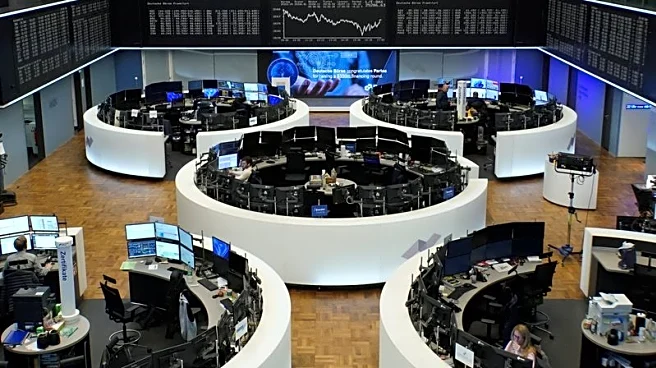What is the story about?
What's Happening?
Health Secretary Robert F. Kennedy Jr., known for his anti-vaccine stance, is focusing on the National Vaccine Injury Compensation Program (VICP), which could impact vaccine production in the U.S. The VICP was established in the 1980s to protect vaccine manufacturers from liability and ensure a steady supply of vaccines. Kennedy has criticized the program as corrupt and broken, suggesting reforms that could lead to increased litigation against vaccine manufacturers. Experts warn that undermining the VICP could repeat historical shortages when manufacturers ceased vaccine production due to lawsuits. Kennedy's actions include appointing Andrew Downing, an attorney experienced in suing vaccine manufacturers, to his staff. Kennedy's potential changes to the VICP, such as adding new conditions or withdrawing vaccine recommendations, could overwhelm the system and deter manufacturers from producing vaccines.
Why It's Important?
The potential changes to the VICP by Health Secretary Kennedy could have significant implications for public health and vaccine availability in the U.S. The VICP has been crucial in maintaining a reliable vaccine supply by protecting manufacturers from extensive legal liabilities. If Kennedy's reforms lead to increased litigation, manufacturers might exit the market, resulting in vaccine shortages. This could affect public health, as vaccines are essential in preventing diseases and maintaining herd immunity. The pharmaceutical industry could face increased legal and reputational risks, impacting their willingness to produce vaccines. Additionally, families with legitimate vaccine injuries might struggle to receive compensation if forced into traditional litigation, which is more costly and uncertain.
What's Next?
Kennedy's actions could lead to significant changes in the VICP, potentially affecting vaccine recommendations and compensation processes. The Centers for Disease Control and Prevention's independent vaccine panel, recently restructured by Kennedy, will review several vaccines, including the hepatitis B vaccine and the combined measles, mumps, rubella, and varicella vaccine. The panel's decisions could influence which vaccines remain covered by the VICP. If recommendations are withdrawn, affected individuals might have to pursue claims through traditional courts, increasing litigation costs and risks for manufacturers. The broader implications of these changes could prompt reactions from public health officials, legal experts, and vaccine manufacturers.
Beyond the Headlines
Kennedy's focus on the VICP raises ethical and legal questions about balancing vaccine safety with public health needs. The program's limitations, such as the backlog of cases and the short timeframe for claims, highlight the need for reform. However, expanding the list of compensable conditions could overwhelm the system and deter manufacturers. The debate over vaccine safety and compensation reflects broader societal tensions between individual rights and collective health responsibilities. Kennedy's actions could shift public perceptions of vaccines, influencing vaccination rates and public trust in health institutions.















